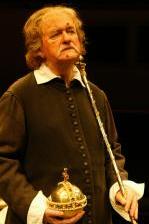SEARCH CurtainUp
REVIEWS
FEATURES
NEWS
Etcetera and
Short Term Listings
LISTINGS
Broadway
Off-Broadway
BOOKS and CDs
OTHER PLACES
Berkshires
London
LA/San Diego
Philadelphia
Elsewhere
QUOTES
On TKTS
LETTERS TO EDITOR
FILM
LINKS
MISCELANEOUS
Free Updates
Masthead
NYC Weather
 London Review
London Review
King Cromwell
by Lizzie Loveridge
|
The English no sooner receive a liberty than they deny it to others
--- Oliver Cromwell
|

Oliver Ford Davies as Oliver Cromwell
(Photo: Robert Day) |
The mid seventeenth century "Interregnum" was after the English Civil War between the execution of Charles I in 1649 and the restoration to the monarchy of Charles' son, Charles II in 1660. There is much interest in this period of history at the moment as we look at the possible reign of yet another Charles. Once more people are asking republican questions raised by the series of crises which have beset the institution of the British monarchy since the mid 1990s.
The play is set towards the end of Cromwell's life in 1657. He is Lord Protector but not king and has no obvious successor. If he were to accept the crown which has been offered him (and here the allusion is made to Shakespeare's Julius Caesar) his heir would be his artistic son Richard (Damien Matthews), whose only qualification is his genes. The meritocratic candidate is Cromwell's associate General John Lambert (Paul Goodwin), author of the English Constitution under the Protectorate, but who has an ambitious wife Frances (Miranda Foster) and about whom Cromwell has some political reservations. As Cromwell ponders as to who is to succeed him (a weak successor and the resulting power vacuum guarantees Charles Stuart landing in Ireland with forces ready to retake the country) he is faced with the dilemma which often confronts self made men.
There is interesting light relief as Cromwell's daughter Bettie (Claudia Elmhirst) discusses the new fashion, opera. As she tries to convince her Puritan father that the opera is not sinful theatre, explaining that "They didn't act. No-one acted. It was OPERA!" Cromwell rails against Monteverdi the way modern day parents abhor Techno and to John Lambert "Theatres are centres of sedition. " The poet Andrew Marvell (Sean Baker) is being interviewed for a government post assisting blind John Milton, and by reading Marvell's poem about the execution of Charles I, Cromwell has to account for his actions at that time. He compares his role with Shakespeare's Bolingbroke's at the deposition of Richard II.
In the second act, Edward Sexby (John Ashton) Cromwell's former fellow soldier and now a Leveller (a member of the revolutionary and egalitarian sect) is brought as a prisoner to Cromwell. However it is Cromwell's actions which are really on trial as Sexby systematically lists how Cromwell in government has compromised the original principles of the Parliamentarian cause.
The performances are excellent. There is Ford Davies himself, likeable and troubled as he ponders the issues. All schoolboys know that Cromwell was the man who, without vanity, told his portrait painter to paint him "warts and all". I liked too Paul Goodwin's conscientious Lambert and Sean Baker's Yorkshire accented Marvell. Miranda Foster flashes angry ambition as Lambert's pretty wife with a backbone of steel and Claudia Elmhirst wheedles round her father pulling for her brother to be made the heir.
The audience is so close to the action that in the opening scene where Oliver Cromwell is in bed in a bare room having been moved there after a bomb threat, it is almost like being in bed with him yourself. The costumes are authentic, the surprise being the frills, fripperies and cleavage on show of the Puritan women.
As the play has to fill in the audience, not all of whom are well versed in seventeenth century history, on the events leading up to this moment, some of the dialogue tends to take on the "Do you remember when we were dealing with the Rump Parliament. . . or when you were staying with us in Wimbledon. . .which can sound artificial. Ford Davies has written a straight forward history play and there's the catch. He is too good an historian to make light of history, to interfere with the known evidence. The resulting play we can be sure is founded in historical fact but as theatre, a bit like life, it does not have a synthesis, a neat coming together of all the issues. Given some judicious cuts and more focus, King Cromwell might have concentrated on whether democracy can come out of military action and how when one attains government, the problem of how to pay for the navy and the army does not solve itself.
| King Cromwell
Written by Oliver Ford Davies Directed by Sam Walters Starring: Oliver Ford Davies With: Hugh Simon, Miranda Foster, Claudia Elmhirst, Damien Matthews, Paul Goodwin, Sean Baker, John Ashton Designer: Sam Dowson Lighting Designer: Kevin Leach Running time: Two hours twenty minutes with one interval. Box Office: 020 8940 3633 Booking to 13th December 2003. Reviewed by Lizzie Loveridge based on 14th November 2003 at the Orange Tree Theatre, Richmond, Surrey.(Tube/Rail: Richmond) |


Mendes at the Donmar
Our Review

Peter Ackroyd's History of London: The Biography

London Sketchbook

Somewhere For Me, a Biography of Richard Rodgers

At This Theater

Ridiculous!The Theatrical Life & Times of Charles Ludlam

The New York Times Book of Broadway: On the Aisle for the Unforgettable Plays of the Last Century

6, 500 Comparative Phrases including 800 Shakespearean Metaphors by CurtainUp's editor.
Click image to buy.
Go here for details and larger image.



